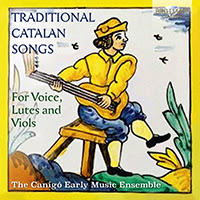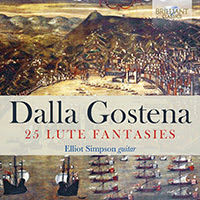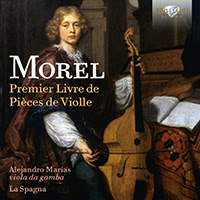Program: #19-41 Air Date: Sep 30, 2019
To listen to this show, you must first LOG IN. If you have already logged in, but you are still seeing this message, please SUBSCRIBE or UPGRADE your subscriber level today.
Lute fantasies of Dalla Gostena, viola da gamba suites of Jacques Morel, and traditional Catalan songs arranged for voice, lutes, and gambas.
NOTE: All of the releases on this program are on the Brilliant Classics label. For more information: https://www.brilliantclassics.com/.
I. Traditional Catalan Songs for Voice, Lutes and Viols (The Canigo Early Music Ensemble). Brilliant Classics CD 95975.

Waters presents the songs in a variety of arrangements – for solo lute or a pair of lutes, for one or two bass violins with or without chordal accompaniment from the theorbo, and then for a trio of musicians accompanying a soprano. In them we find tales of love, jealousy, escape and murder, the raw material for graphically drawn music by composers up to de Falla, Gerhard and beyond. But there are also gentler numbers that evoke a pastoral mood and depict childhood and rural ways. There is even a harvest song, Els Segadors, which in time became a national anthem for Catalonia.
These stories are explained by brief but valuable contextual notes in the booklet, which also prints the texts of the songs in both Catalan and English translation. A previous Brilliant Classics album by William Waters revives the lute music of the 17th-century Silesian composer Esiaias Reusner (BC95242). The album was reviewed in glowing terms by the Italian Giornale della musica, praising Waters’ sensitive evocation of the ‘peace and tranquillity transmitted by Reusner’s music.’ Here he is joined by the members of a Catalan-based early music ensemble for a vividly presented sense of authenticity.
A unique collection of songs from Catalonia, a Spanish region rich in culture and with a strong identity, its origins going back to the Middle Ages, a period in which troubadours sang of love, war, nature, honor and betrayal.
The program contains songs for voice and ensemble, as well as arrangements of popular melodies for a diversity of instruments from the time of origin.
Sung by Marta Garcia Cadena (soprano) and instrumentalist William Waters, playing baroque lute, lyra violin, bass violin, baroque guitar and renaissance lute.
The extensive booklet notes include the original song texts and their English translation, as well as a description of each individual song.
Traditional: Matinet m’en llevo
Traditional: La cançó del lladre
Traditional: L’Enyor
Traditional: El fadrinet
Traditional: L’Espanyolet
Traditional: Muntanyes del canigó
Traditional: Margarideta
Traditional: La dama de reus and el capitel·lo
Traditional: La dama d’aragó
Traditional: El mestre
Traditional: El comte arnau
Traditional: El cant dels ocells
Traditional: Mariagneta
Traditional: El mariner
Traditional: La cadena d’amor
Traditional: La dida
Traditional: La calma de la mar
Traditional: Plany
Traditional: El testament d’amèlia
Traditional: Rosa del folló
Traditional: La mort i l’enamorat
Traditional: La gata i el belitre
Traditional: Els segadors
Traditional: La dama de reus
Traditional: La presó de lleida
Traditional: Rossinyol que vas a frança
Traditional: La donzella del rosselló
Traditional: Adéu Nina
II. Dalla Gostena: 25 Lute Fantasies (Elliot Simpson, guitar). Brilliant Classics CD 95944.

It is through his nephew that we now know Dalla Gostena best, through this volume of lute fantasias posthumously published by Molinaro, and in affecting tribute to the memory of his uncle. A leading figure in the musical life of his home city, Dalla Gostena wrote in a conservative but beautifully wrought style. These fantasias make extraordinary demands upon the performer, due in no small part
to the complex polyphony borrowed from his madrigals and masses. They belong to the repertoire of every skilled lutenist but they are very rarely recorded as a collection, making Elliott Simpson’s new album an essential acquisition for collectors of Renaissance music on record. Born in 1987, this American guitarist has worked with leading composers of our own time such as Sofia Gubaidulina, Alvin Lucier and Michael Finnissy, but he also has an abiding interest in and thorough understanding of the Renaissance-era music which establishes the underlying elements and principles of modern guitar repertoire.
Giovanni Battista Dalla Gostena (1540-1593) was born in Genoa, Italy. He was a pupil of the renowned Flemish composer Philippe de Monte. He held the prestigious post of Maestro di Cappella at the San Lorenzo Cathedral in his native Genoa. He composed and published several sets of vocal madrigals.
Gostena’s 25 Lute Fantasies were published in Venice in 1599. The fantasies show evidence of profound instrumental knowledge and make extraordinary demands upon the performer, due in no small part to the complex polyphony borrowed from contemporaneous vocal and keyboard genres.
Elliot Simpson (born 1987) is one of the foremost lute players of the young generation. Recipient of the prestigious Huygens Grant from the Dutch government for his “extraordinary contribution to new music” he has given premieres of works by Gubaidulina, Finnissy, Zimmermann and Polansky.
Giovanni Battista Dalla Gostena: Fantasy II
Giovanni Battista Dalla Gostena: Fantasy III
Giovanni Battista Dalla Gostena: Fantasy IV
Giovanni Battista Dalla Gostena: Fantasy V
Giovanni Battista Dalla Gostena: Fantasy VI
Giovanni Battista Dalla Gostena: Fantasy VII
Giovanni Battista Dalla Gostena: Fantasy VIII
Giovanni Battista Dalla Gostena: Fantasy IX
Giovanni Battista Dalla Gostena: Fantasy X
Giovanni Battista Dalla Gostena: Fantasy XI
Giovanni Battista Dalla Gostena: Fantasy XII
Giovanni Battista Dalla Gostena: Fantasy XIII
Giovanni Battista Dalla Gostena: Fantasy XIV
Giovanni Battista Dalla Gostena: Fantasy XV
Giovanni Battista Dalla Gostena: Fantasy XVI
Giovanni Battista Dalla Gostena: Fantasy XVII
Giovanni Battista Dalla Gostena: Fantasy XVIII
Giovanni Battista Dalla Gostena: Fantasy XIX
Giovanni Battista Dalla Gostena: Fantasy XX
Giovanni Battista Dalla Gostena: Fantasy XXI
Giovanni Battista Dalla Gostena: Fantasy XXII
Giovanni Battista Dalla Gostena: Fantasy XXIII
Giovanni Battista Dalla Gostena: Fantasy XXIV
Giovanni Battista Dalla Gostena: Fantasy XXV
III. Morel: Premier Livre de Pièces de Violle (La Spagna/Alejandro Marías, gamba). Brilliant Classics CD 95962.

The volume itself was published in 1709, two years before Marin Marais’s Third Book of pieces. Morel’s date of birth is now obscured by time, but we know that he was this book. And indeed Morel makes no a pupil of Marais, to whom he dedicated attempt to disguise the debt he felt to his master within his music.
The book contains four Suites for viola da gamba and continuo – in A minor, D minor, D major and G major, respectively – and a Chaconne en trio for a traverso flute, viol and basso continuo. This gentle and courtly six-minute Chaconne is the only piece of Morel’s that is regularly performed, but the four Suites are full of delightful discoveries. The second of them begins with a Prelude of bold and grave gestures which introduce a colourful suite of character pieces: the Allemande la Jolie (‘The pretty one’), the Courante la Dacier, a gentle, dream-like Sarabande and the Gigue l’Inconstante (‘The faithless one’). To end, there is an enjoyable rondeau, Le Folet (‘The imp’), and La Fanchonnette, reminiscent of a gavotte in feel and structure.
The other three suites are no less picturesque, and they are brought to life once more on this album by an early-music group founded in 2009 and named after a popular Renaissance dance. La Spagna has been awarded Spain’s GEMA prize for best young Early Music group.
Very little is known of the life of Jacques Morel (fl. 1700-1747) except that he was a pupil of the great composer Marin Marais, to whom he dedicated his “premiere livre de pieces de violle”.
The book that contains the pieces of this disc was printed for the first time in 1709, two years before Marin Marais published his Troisième Livre de Pièces de Viole. Morel's music is, of course, very much influenced by that of his teacher, and the author not only does not hide this heritage but he boasts about it.
However, Morel is a later generation and knows how to introduce certain very important innovations in writing for viola da gamba. From the instrumental point of view, Morel's music is closely linked to the French tradition, but you can see an evolution in his fingerings.
Spanish Viola da Gamba player Alejandro Marías studied with Jordi Savall, Anner Bylsma, Christophe Coin and Jaap ter Linden. He is artistic director of the ensemble La Spagna, with whom he discovers and performs hidden treasures of the Baroque.
The excellent liner notes in the booklet are written by the artist.
Jacques Morel: Suite No. 1 in A Minor: I. Prélude. Lentement – Vîte
Jacques Morel: Suite No. 1 in A Minor: II. Allemande
Jacques Morel: Suite No. 1 in A Minor: III. Courante
Jacques Morel: Suite No. 1 in A Minor: IV. Sarabande l’agréable
Jacques Morel: Suite No. 1 in A Minor: V. Gigue
Jacques Morel: Suite No. 1 in A Minor: VI. La bretonne. Gratieusement
Jacques Morel: Suite No. 1 in A Minor: VII. Menuets I & II
Jacques Morel: Suite No. 2 in D Minor: I. Prélude
Jacques Morel: Suite No. 2 in D Minor: II. Allemande la jolie
Jacques Morel: Suite No. 2 in D Minor: III. Courante la dacier
Jacques Morel: Suite No. 2 in D Minor: IV. Sarabande
Jacques Morel: Suite No. 2 in D Minor: V. Gigue l’inconstante
Jacques Morel: Suite No. 2 in D Minor: VI. Le follet
Jacques Morel: Suite No. 2 in D Minor: VII. La fanchonette
Jacques Morel: Suite No. 3 in D Major: I. Prélude
Jacques Morel: Suite No. 3 in D Major: II. Boutade de Sainct Germain
Jacques Morel: Suite No. 3 in D Major: III. Allemande la brillante & double
Jacques Morel: Suite No. 3 in D Major: IV. Courante
Jacques Morel: Suite No. 3 in D Major: V. Sarabande l’Aurore
Jacques Morel: Suite No. 3 in D Major: VI. Gigue à l’anglaise
Jacques Morel: Suite No. 3 in D Major: VII. Gavotte
Jacques Morel: Suite No. 3 in D Major: VIII. Fugue. Gayment
Jacques Morel: Suite No. 3 in D Major: Échos de Fontainebleau
Jacques Morel: Suite No. 4 in G Major: I. Prélude. Lentement
Jacques Morel: Suite No. 4 in G Major: II. Fantaisie. Gayement
Jacques Morel: Suite No. 4 in G Major: III. Allemande
Jacques Morel: Suite No. 4 in G Major: IV. Courante
Jacques Morel: Suite No. 4 in G Major: V. Sarabande
Jacques Morel: Suite No. 4 in G Major: VI. Gigue à l'italienne
Jacques Morel: Suite No. 4 in G Major: VII. Rondeau dauphin
Jacques Morel: Suite No. 4 in G Major: VIII. Menuet
Jacques Morel: Suite No. 4 in G Major: IX. La guerandoise & double
Composer Info
Giovanni Battista Dalla Gostena (1540-1593), Jacques Morel (fl. 1700-1747)
CD Info
Brilliant Classics CD 95975, Brilliant Classics CD 95944, Brilliant Classics CD 95962